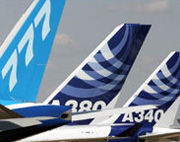|
 |
| The companies
have failed to hammer out an
agreement |
One of the bitterest transatlantic trade battles has
formally begun, after the World Trade Organization (WTO) opened a probe
into aircraft
makers.
The WTO set up panels to investigate tit-for-tat accusations that the
US and EU unfairly supported their biggest plane manufacturers, Boeing and
Airbus.
The probe could become the costliest and most complicated case in the
WTO's 10-year history.
The US went to the WTO last October, provoking a counter-claim from
Europe.
The battle over aircraft subsidies comes at a time when the US and the
EU are locked in key negotiations over the future of world trade ahead of
a key meeting in Hong Kong.
Now the WTO plans to set up two panels to deal with Boeing's
allegations and those made by Airbus. Even agreeing who should sit on each
panel could take months, say officials.
"This case will be the most complicated case that the WTO has ever
handled," Fabian Delcros, an EU spokesman in Geneva, told Associated
Press.
"But the communication channels (with the US) remain open."
The US said it would also prefer to reach a settlement and is "prepared
to negotiate in parallel with (its) WTO case," Richard Mills, a spokesman
for US trade representative Robert Portman, told AP.
Meanwhile, French Trade Minister Christine Lagard added: "Nothing stops
us from talking (with the Americans) right up until the last day of the
procedure, which can be long."
EU Trade Commissioner Peter Mandelson has previously warned the dispute
could take "years to resolve", adding it was likely to result in a legal
stalemate.
The US claims that financial assistance given to Airbus to launch new
models is illegal under global trade rules. It says this assistance
appears to be "export subsidies".
It particularly concern is to prevent European governments from
assisting Airbus financially in the development of the new A350 mid-size
jet which will compete with Boeing's new 787 Dreamliner.
But subsidies for the Airbus A380 superjumbo are also a worry.
Europe has counter-challenged the US by describing Boeing's various tax
breaks, financing arrangements and grants for space and military research
as "prohibited and actionable".
At issue is whose aircraft will dominate the skies in the future and
whether they will do so unfairly because of large government subsidies.
The US and the EU had reached an informal deal to limit state subsidies
in 1992, but both sides subsequently accused the other of breaching the
accord.
The current escalation of problems seems to have been fuelled by
Airbus' growing competitiveness and its ambitions for the A380.
Boeing has long been the dominant supplier of commercial aircraft and
the leading export company in the US.
But in recent years its dominance has been challenged by Airbus, a
consortium which includes production centres in four European countries.
At the Paris Air Show, Airbus announced that it had overtaken Boeing in
terms of new orders and showed its Airbus 380 to the public for the first
time.
(BBC) | 